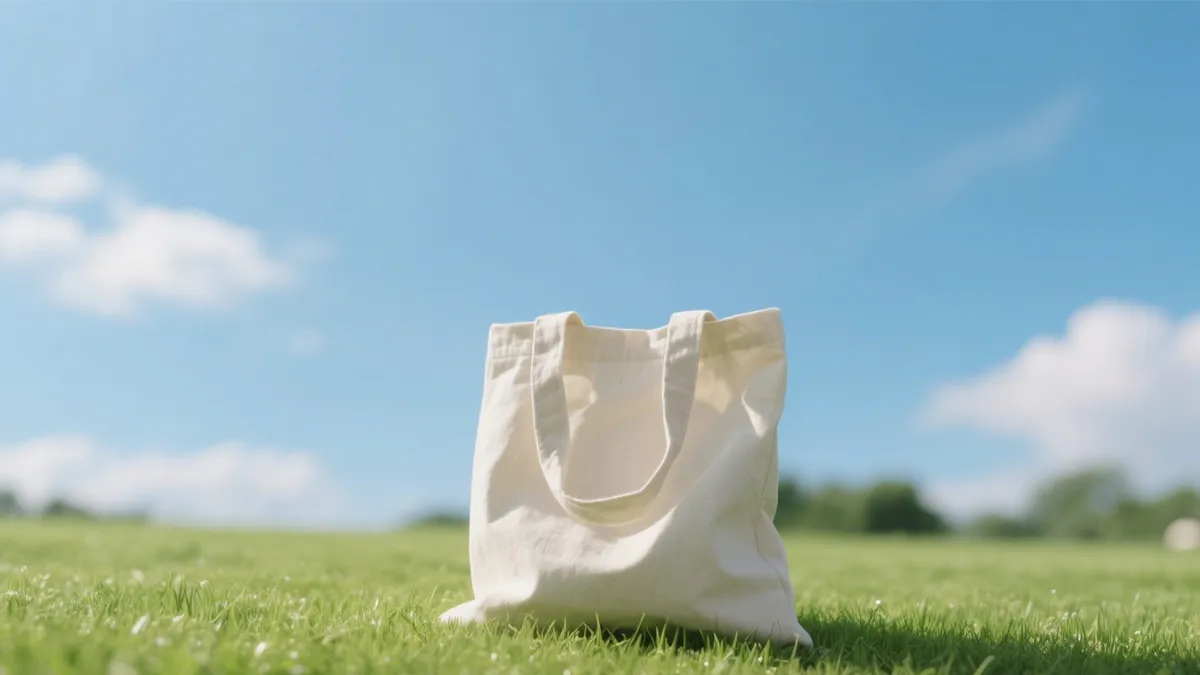Sustainability has become a hot topic in every industry, especially in the world of packaging and reusable products. As more consumers and brands look for eco-friendly alternatives to single-use plastic bags, cotton tote bags have gained huge popularity. But are cotton tote bags really sustainable?

As a manufacturer specializing in cotton tote bags, we know the answer is not black and white. Sustainability depends on many factors—from the cotton sourcing and manufacturing process to how often the bag is used and how it’s disposed of. In this article, we’ll take a deep dive into what makes cotton tote bags sustainable (or not) from the perspective of a manufacturer. We’ll share insights on materials, production, certifications, and tips for brands looking to offer truly eco-friendly products.
What Makes a Product Sustainable?
Before answering whether cotton tote bags are sustainable, we first need to understand what sustainability means in the product world. Sustainability generally means:
- Using renewable or natural resources
- Having a low environmental footprint during production
- Being durable and designed for multiple uses
- Being biodegradable or recyclable at end-of-life
- Having certifications to prove compliance with environmental standards
For cotton tote bags, sustainability depends on how the cotton is grown, how the bag is made, how long it lasts, and what happens to it after use.
Cotton Tote Bags: Material Overview
Cotton is a natural fiber derived from the cotton plant. It is renewable and biodegradable, which already gives cotton an edge over synthetic materials like polyester. However, the sustainability of cotton depends heavily on how the cotton is grown.
There are several types of cotton commonly used for tote bags:
- Conventional cotton: Grown with synthetic pesticides and fertilizers, often requiring large amounts of water. It tends to have a higher environmental impact.
- Organic cotton: Grown without synthetic chemicals, using natural pest control and fertilizer methods. Organic cotton typically uses less water and maintains healthier soil.
- Recycled cotton: Made from post-consumer textile waste, reducing the need for new cotton cultivation.
From our manufacturing perspective, sourcing organic or recycled cotton greatly improves the sustainability profile of the tote bags we produce.
How We Source Cotton at INITI
At INITI, we prioritize sourcing cotton from suppliers certified under the Global Organic Textile Standard (GOTS). This certification ensures the cotton is grown responsibly without harmful chemicals and processed in an environmentally and socially responsible way.
We also collaborate with partners who provide recycled cotton fibers to help reduce textile waste and carbon footprint. By carefully selecting raw materials, we ensure the cotton tote bags we manufacture are built on a solid foundation of sustainability.
How Cotton Tote Bags Are Manufactured
Making a cotton tote bag involves several steps:
- Spinning: Turning cotton fibers into yarn
- Weaving or knitting: Creating fabric from the yarn
- Dyeing or printing: Adding color or logos
- Cutting and sewing: Assembling the tote bag
- Finishing touches: Adding straps, labels, and packaging
Each stage has an environmental footprint—energy consumption, water usage, and potential chemical pollution.
Sustainable Manufacturing Practices We Follow
- We use water-based and low-impact dyes that are free of harmful VOCs (volatile organic compounds).
- Our dyeing and printing processes minimize water and energy use through advanced machinery.
- Fabric scraps and offcuts are collected and recycled or reused as cleaning cloths.
- Our factory operates under an ISO 14001 Environmental Management System, ensuring we continuously reduce emissions and waste.
- Packaging for finished bags uses biodegradable materials or recycled cardboard to cut down plastic waste.
By controlling every manufacturing step, we ensure our cotton tote bags are as eco-friendly as possible.
Durability and Reusability: The Real Measure of Sustainability
One of the biggest sustainability advantages of cotton tote bags is their durability. A single well-made cotton tote bag can last for hundreds of uses, making it a far better alternative to single-use plastic or paper bags.
Consider this comparison:
| Material | Approximate Reusable Lifespan | Biodegradability | Environmental Impact during Manufacture | End-of-Life Options |
|---|---|---|---|---|
| Cotton Tote Bag | 100–500+ uses | Yes | Medium | Compostable / Recyclable |
| Plastic Bag | 1–2 uses | No | Low | Landfill / Difficult to Recycle |
| Paper Bag | 3–5 uses | Yes | High (Water usage in paper making) | Recyclable / Compostable |
From a manufacturing standpoint, this durability means that even if cotton production uses more resources upfront compared to plastics, the long-term environmental benefit is significant.
Packaging and Logistics: Hidden Factors Affecting Sustainability
Sustainability doesn’t end at manufacturing. How bags are packaged and shipped also affects their overall footprint.
At INITI, we minimize packaging waste by using:
- Bulk shipping cartons made from recycled materials
- Biodegradable or recyclable packing fillers instead of plastic
- Optimized loading to reduce carbon emissions during transport
By improving logistics efficiency, we help reduce the carbon footprint associated with delivering cotton tote bags to customers worldwide.
Certifications and Compliance: Proof of Sustainability
Certifications provide independent validation that cotton tote bags meet environmental and social responsibility standards. The most recognized include:
- GOTS (Global Organic Textile Standard): For organic fibers and sustainable processing
- OEKO-TEX Standard 100: Testing for harmful substances in textiles
- Fair Trade Certification: Ethical labor and farming practices
We provide full transparency by offering certifications and third-party lab reports to our clients, ensuring they can confidently market their bags as sustainable products.
Cotton Bag End-of-Life: Biodegradability and Recycling
Unlike synthetic bags that persist in the environment for decades, cotton tote bags are biodegradable. When discarded, they naturally break down within months under composting conditions.
Moreover, cotton bags can be:
- Recycled into cleaning rags or insulation material
- Upcycled into new textile products or crafts
This biodegradability makes cotton tote bags an excellent choice for brands concerned about reducing long-term environmental impact.
Common Concerns and Misconceptions
Is Cotton Really Water-Intensive?
It’s true conventional cotton farming requires significant water, but this varies by region and farming method. Organic cotton and recycled cotton drastically reduce water use.
Aren’t Cotton Bags Less Eco-Friendly Than Plastic?
While cotton production is resource-intensive, the key lies in reusability. Using a cotton tote bag hundreds of times results in far lower overall environmental impact than using dozens of single-use plastic bags.
How Brands Can Choose Truly Sustainable Cotton Tote Bags
For brands looking to offer sustainable cotton bags, here are important tips:
- Verify raw material sourcing: Demand organic or recycled cotton certifications
- Check manufacturing processes: Ask about dye types, water use, and waste management
- Request certifications: GOTS, OEKO-TEX, or others to back sustainability claims
- Opt for eco-friendly packaging: Reduce plastic and waste in shipping materials
Our Sustainable Custom Options at INITI
| Option | Description |
|---|---|
| 100% Organic Cotton | GOTS certified, pesticide-free, eco-friendly |
| Recycled Cotton | Upcycled post-consumer fibers reducing waste |
| Water-Based Ink Printing | Non-toxic, low environmental impact |
| Biodegradable Packaging | Compostable kraft paper or PLA bags for shipping |
| FSC-Certified Hangtags | Eco-friendly branding accessories |
By combining these options, we help our clients create truly green products that appeal to eco-conscious consumers.
Final Verdict: Are Cotton Tote Bags Sustainable?
From a manufacturer’s perspective, cotton tote bags are sustainable when made responsibly—from organic or recycled cotton, with eco-conscious manufacturing, durable design, and biodegradable end-of-life.
However, sustainability is a shared responsibility. Brands must choose suppliers carefully and educate consumers on reusing bags multiple times to maximize their environmental benefits.
At INITI, we are committed to delivering high-quality, customizable cotton tote bags that meet the highest sustainability standards. Together with our clients, we are helping build a greener future—one cotton tote at a time.
Conclusion
Sustainability is more than just materials — it’s about how products are designed, manufactured, used, and disposed of. Cotton tote bags have the potential to be a truly eco-friendly choice if every step in the supply chain prioritizes environmental responsibility.
If you are a brand or retailer looking for sustainable cotton tote bags made with care and certified eco-materials, INITI is your trusted manufacturing partner. Contact us today to learn more about our customization options and start your journey toward greener packaging solutions.
FAQ
Are cotton tote bags truly eco-friendly compared to plastic bags?
Yes. Cotton tote bags are made from natural, biodegradable fibers and can be reused hundreds of times. Although cotton production requires more water and energy upfront, the long-term environmental benefits come from their durability and biodegradability, making them a greener alternative to single-use plastic bags.
What type of cotton is best for sustainable tote bags?
Organic cotton certified by standards like GOTS is the best option because it is grown without synthetic pesticides or fertilizers, uses less water, and supports healthier soil. Recycled cotton is also a great sustainable choice as it reduces waste by reusing post-consumer fibers.
How does manufacturing affect the sustainability of cotton tote bags?
Sustainable manufacturing involves using eco-friendly dyes, energy-efficient processes, waste recycling, and responsible packaging. At INITI, we apply water-based inks, recycle fabric scraps, and use biodegradable packaging to minimize environmental impact during production.
Can cotton tote bags be recycled or composted after use?
Yes. Cotton tote bags are biodegradable and will naturally break down in composting environments within months. They can also be repurposed or recycled into cleaning cloths or insulation materials, reducing landfill waste.
How many times can I reuse a cotton tote bag to make it sustainable?
Research shows a cotton tote bag needs to be used at least 100 times to offset the environmental footprint of its production compared to single-use plastic bags. Proper care and durability can extend this lifespan even further.
Does INITI offer customizable sustainable cotton tote bags?
Absolutely. We provide a range of customization options including 100% organic cotton fabric, recycled cotton blends, water-based printing, and eco-friendly packaging solutions—all designed to help your brand meet sustainability goals.
Are cotton tote bags waterproof or suitable for heavy items?
Cotton tote bags are breathable but not waterproof. However, we can customize bag thickness, fabric weight, and lining to enhance durability and meet specific customer requirements for heavier loads.
What certifications do INITI cotton tote bags have for sustainability?
Our bags can come with GOTS organic cotton certification, OEKO-TEX standard for safe textiles, and we ensure compliance with environmental management standards like ISO 14001. We provide documentation to support your sustainability claims.
Is the water consumption for cotton farming a big concern?
Water use varies depending on cotton farming practices. Organic and recycled cotton require significantly less water than conventional cotton. We prioritize sourcing cotton from suppliers using water-efficient and sustainable agriculture methods.
How does using cotton tote bags help brands build a sustainable image?
Offering certified sustainable cotton tote bags demonstrates your brand’s commitment to environmental responsibility. It appeals to eco-conscious consumers, enhances corporate social responsibility (CSR) efforts, and differentiates your products in a competitive market.





